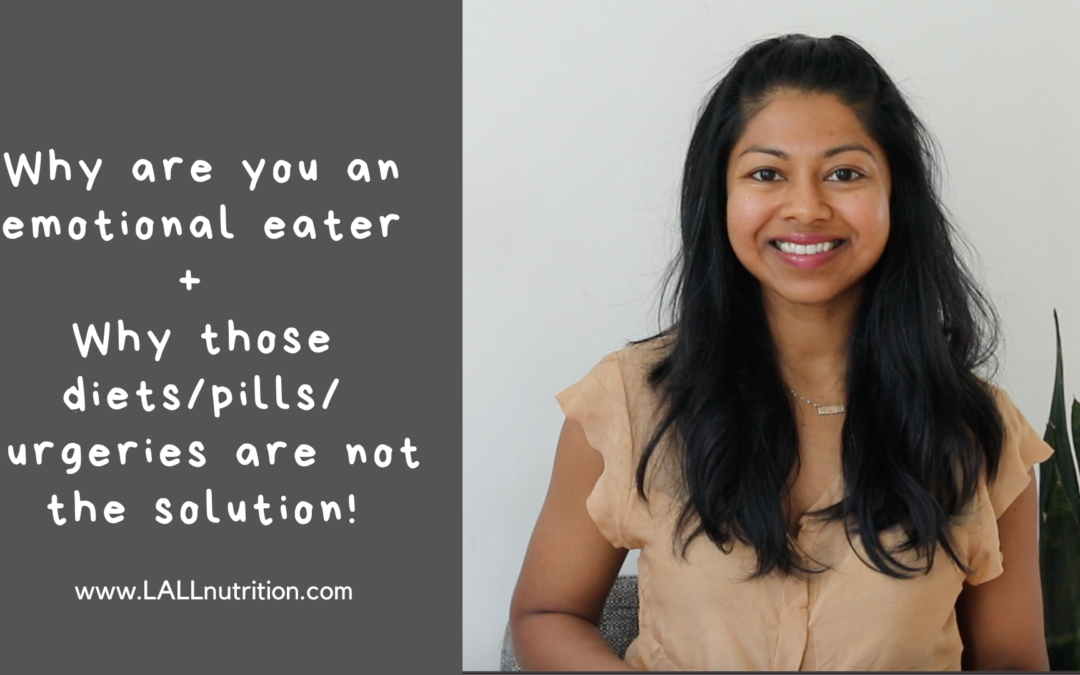Hello love!
Today I wanted to share with you why you might be an emotional eater and why those diet pills and surgeries are not necessarily the answer. If you’re an emotional eater, what is happening is something much deeper than a diet, a pill or a surgery is going to solve. Those things are all bandaids.
I say that because I struggled with emotional eating for many years and I tried so many diets. It didn’t matter which diet I tried, I would restrict. Yo-Yo, and use all my willpower. I didn’t create better habits. I didn’t reach my goals. So when this kept happening to me I knew I needed to find a better way.
What I found was that the old way of doing things, the conventional system of diets, pills and surgeries are not the solution. I say that because I tried so many diets and the women I work with have tried the diets, the pills, the surgeries. It’s a long term consequence to have surgery. I’ve worked with clients that have it done and are still be in the same position.
Surgery doesn’t help them because that urge to to eat and overeat is still there. the emotional eating and binging is not being resolved. It doesn’t get to the root of emotional eating.
Why you might be an emotional eater
1.Family Patterns
One reason that you might be an emotional eater is that you learn this from your family. I’ve heard countless women say that their families taught them to emotionally eat whatever emotion they were feeling.
When we’re little and we see our parents doing something, they don’t have to tell us to do it. We absorb that information. That’s how our brain works. We absorb their patterns and behaviours by osmosis. We don’t even need to learn it. It becomes something we take with us for the rest of our life unless we do something about it.
2.Food Makes us Feel Good
The second thing is that we realize that food made us feel good.When we eat food, physiologically we feel good because “feel good” chemicals are released. It’s like when we go on social media or shop to feel good. So if we’re in a “bad mood” that we feel uncomfortable feeling, we go towards food or something else to make us feel good.
The thing is that when we develop this habit it becomes so automatic that we just crave the food. We want to eat the food. We don’t even realize we’re not feeling that great underneath. That there’s some kind of emotion that doesn’t feel good.
3.True Hunger?
The third thing that I see a lot is that emotional eaters were never taught the difference between true hunger and emotional hunger.
We’re not taught this in diets or meal plans. I didn’t have a clue about my hunger. I was hungry all the time or I would just randomly eat five meals in a row. I didn’t know what was happening to me. Diets just tell you to restrict, to use your willpower, that you are stronger than this urge. But something deeper is going on that does have a lot more power and control.
If you’ve been on diets, you know that you eventually fall off of them because something bigger is going on.
4.Do You Know How to Feel?
As a society, we are not taught how to feel our emotions, process them, resolve them. We are taught to distract from them, to dismiss them, to run away from them. We don’t know what to do with those emotions. We might be really aware of them, but we don’t know what to do.
So we go towards the food because it temporarily makes us feel better. Food doesn’t get rid of how we’re feeling, but temporarily we feel OK. So something more is needed.
If you notice, with all of the reasons why you might be emotionally eating, you saw that none of it had to do with your body being broken. None of it had to do with needing more willpower. And none of it had to do with needing surgery.
It boiled down to your emotions and different reasons why your emotions come up. So what do we need? We need a different solution. We need to learn how to process, move through and resolve our emotions.
What Do We Need?
1.Resolve the Emotion
We need to go deeper into the body and resolve them. We need to make sure we get to the root of the emotion. Otherwise it’s always going to be coming and we’re going to constantly be coping with that emotion. We’re not going to be resolving it.
We’re going to constantly be in battle with food because we haven’t dealt with the real cause of it.
2.Accept Our Body
The second thing is that we need to learn body acceptance and stop punishing our bodies with these diets, pills and surgeries. We need to stop saying something’s wrong with our body or believing something’s wrong with our body when nothing is inherently wrong with our body.
We don’t realize the the amazing this of our body. We look to the outside. It’s not to say that you can’t eventually lose weight, but when you’re hating yourself to a better body or hating yourself to love yourself, that doesn’t make sense. You need to go deeper and learn true body acceptance.
3.True Nourishment
True nourishment and strategic digestion is important because after years of dieting and messing with your body and maybe never really learning how to nourish your body through these diets, your body is depleted.
It needs nutrients and it needs strategic digestion. When we are in this emotional turmoil, we are stressing ourselves out. That impacts our digestion and physically that also impacts our mood.
We need to really deeply nourish our body. The body is the container and emotions also live in the body. So we need to make sure we are nourishing our bodies.
These three steps are key and pivotal. It’s not one or the other. It’s not nourishing yourself or body acceptance or emotional wellness. It’s all of these synergistically together to help move you through emotional eating. It is not a surface solution. This is a deep rooted solution that I’ve used and helped clients use.
Emotional eating has deeper roots. It’s not just about controlling what you eat, and it’s not just about something being wrong with your body.
If you have any questions, please let me know. I hope this video was helpful and I look forward to sharing more with you 🙂
~Michelle
Certified Holistic Nutritionist.


